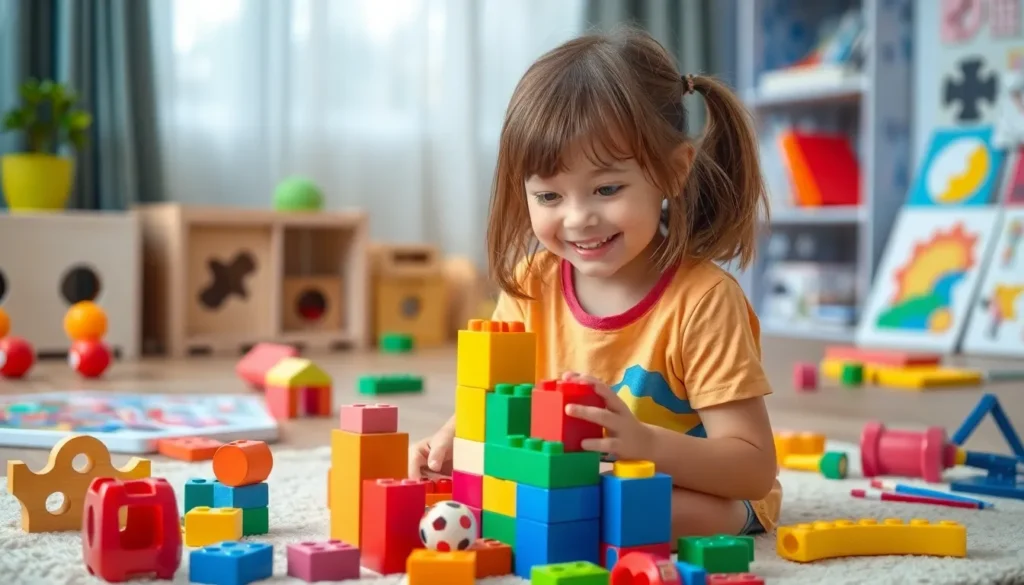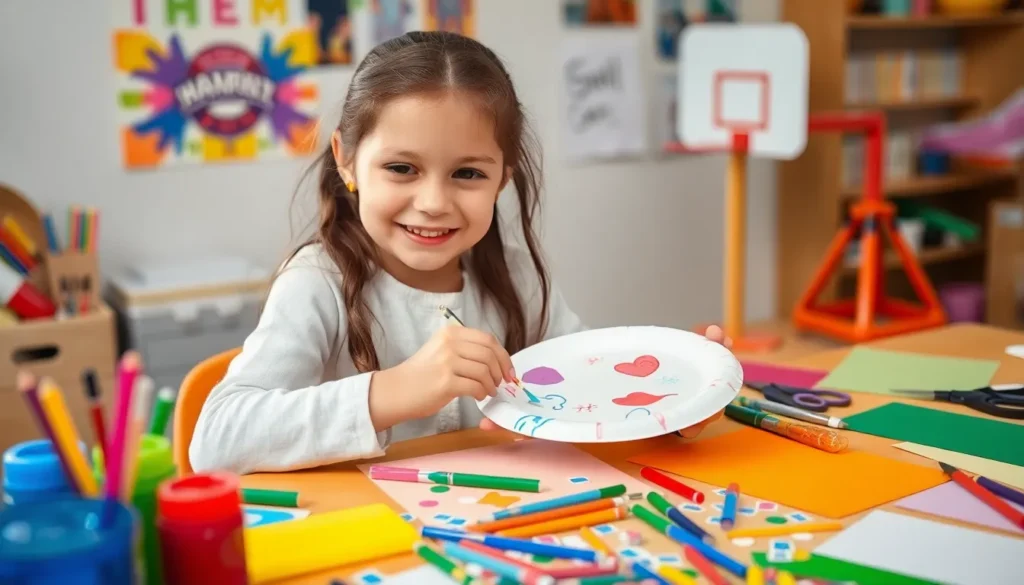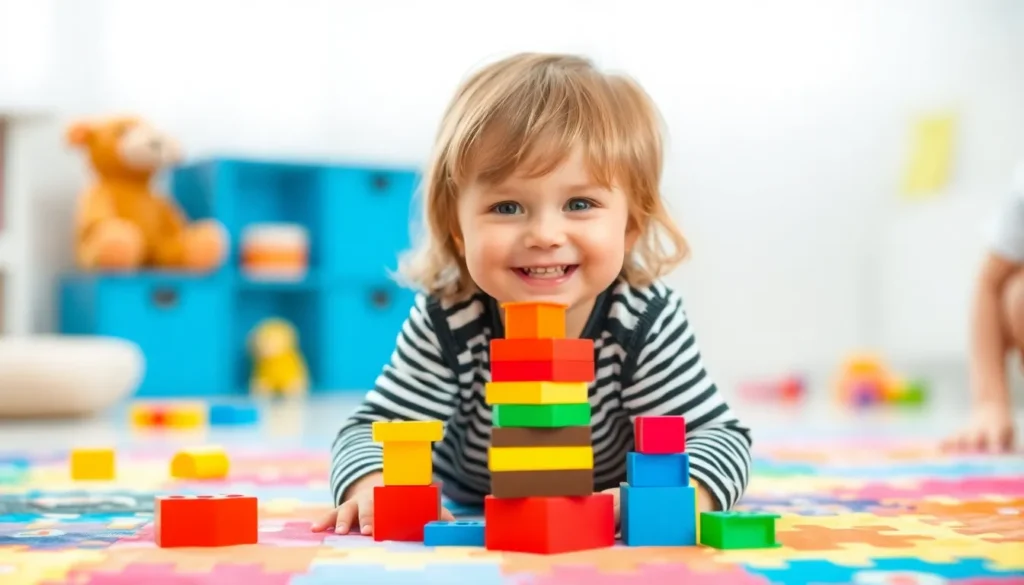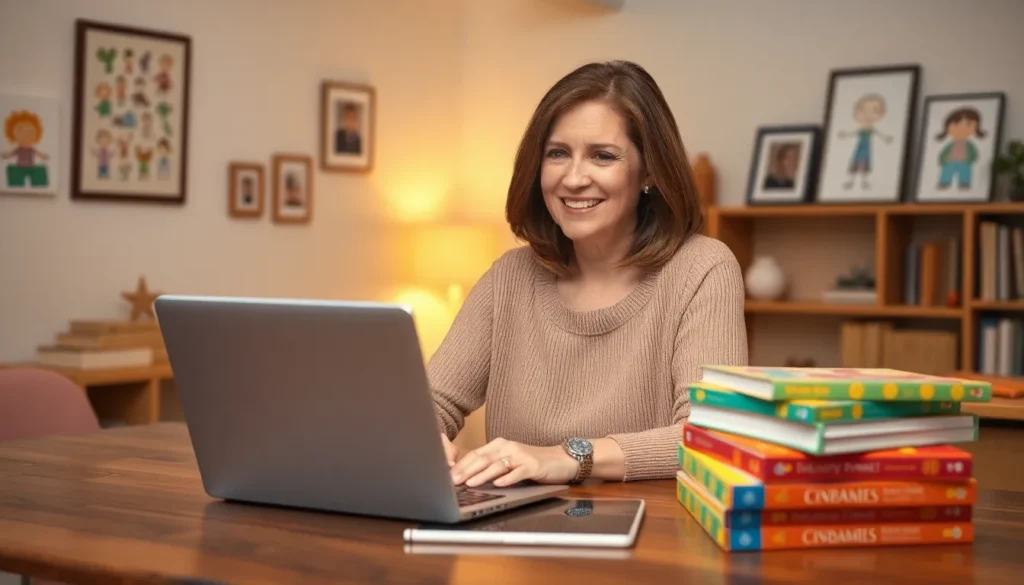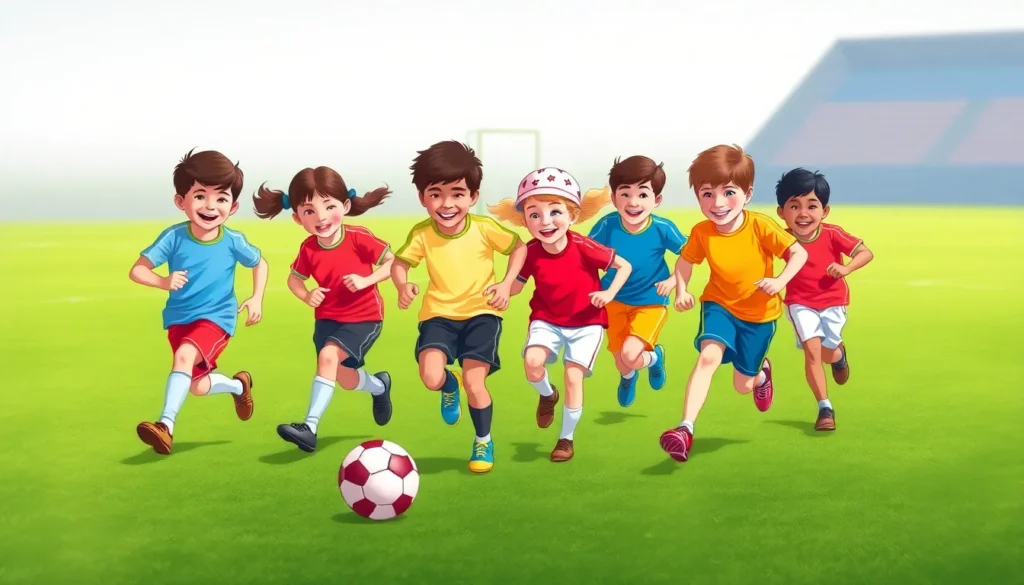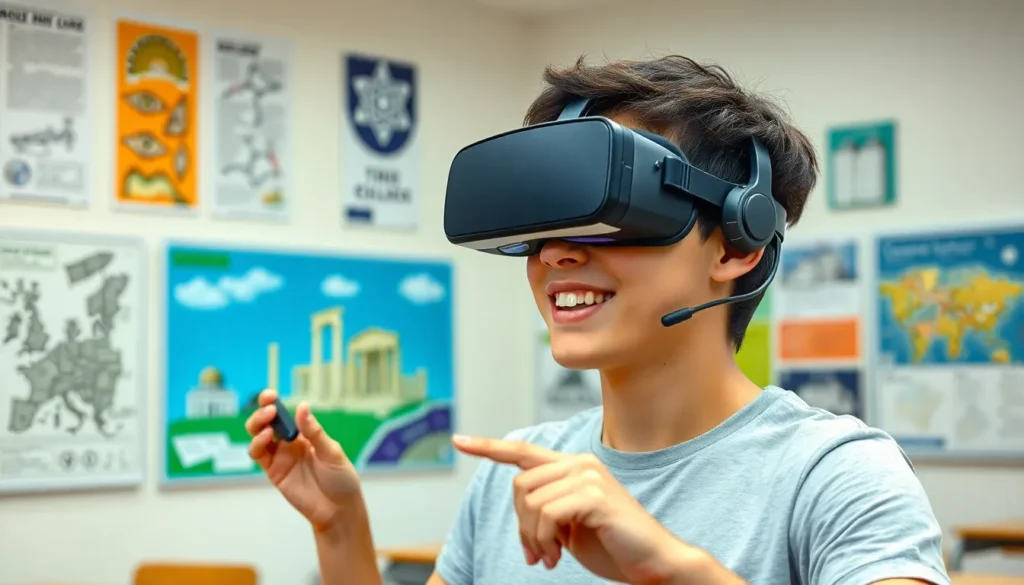Choosing the right toys for 3-4 year olds can feel like navigating a minefield of glitter and plastic. But fear not! The right educational toys not only keep little hands busy but also spark creativity and ignite curiosity. Imagine toys that turn playtime into a mini classroom where learning happens without the kids even realizing it.
Table of Contents
ToggleBenefits of Educational Toys for 3-4 Year Olds
Educational toys play a significant role in the development of 3-4 year olds. These toys not only engage children but also promote essential skills.
Cognitive Development
Cognitive development flourishes with the right educational toys. Toys that involve problem-solving, pattern recognition, and memory exercises stimulate mental engagement. Puzzles enhance critical thinking while helping children recognize shapes and colors. Counting games introduce math concepts through playful practice. Toys that encourage imaginative play, such as building blocks, foster creativity and spatial awareness. Additionally, books with interactive elements engage children’s curiosity and language skills. Various examples illustrate how educational toys transform play into valuable learning experiences that aid cognitive growth.
Social Skills Enhancement
Social skills enhancement is another key benefit of educational toys. Collaborative games encourage teamwork and communication among children. Toy sets designed for group play, like kitchen sets or tool kits, promote sharing and cooperation. Role-playing scenarios inspire empathy and understanding of diverse perspectives. This interaction with peers fosters both verbal and non-verbal communication. Toys that require turn-taking teach patience and respect for others. Through these shared experiences, children establish friendships and learn conflict resolution skills. Engaging with educational toys effectively strengthens social connections in early development phases.
Types of Educational Toys
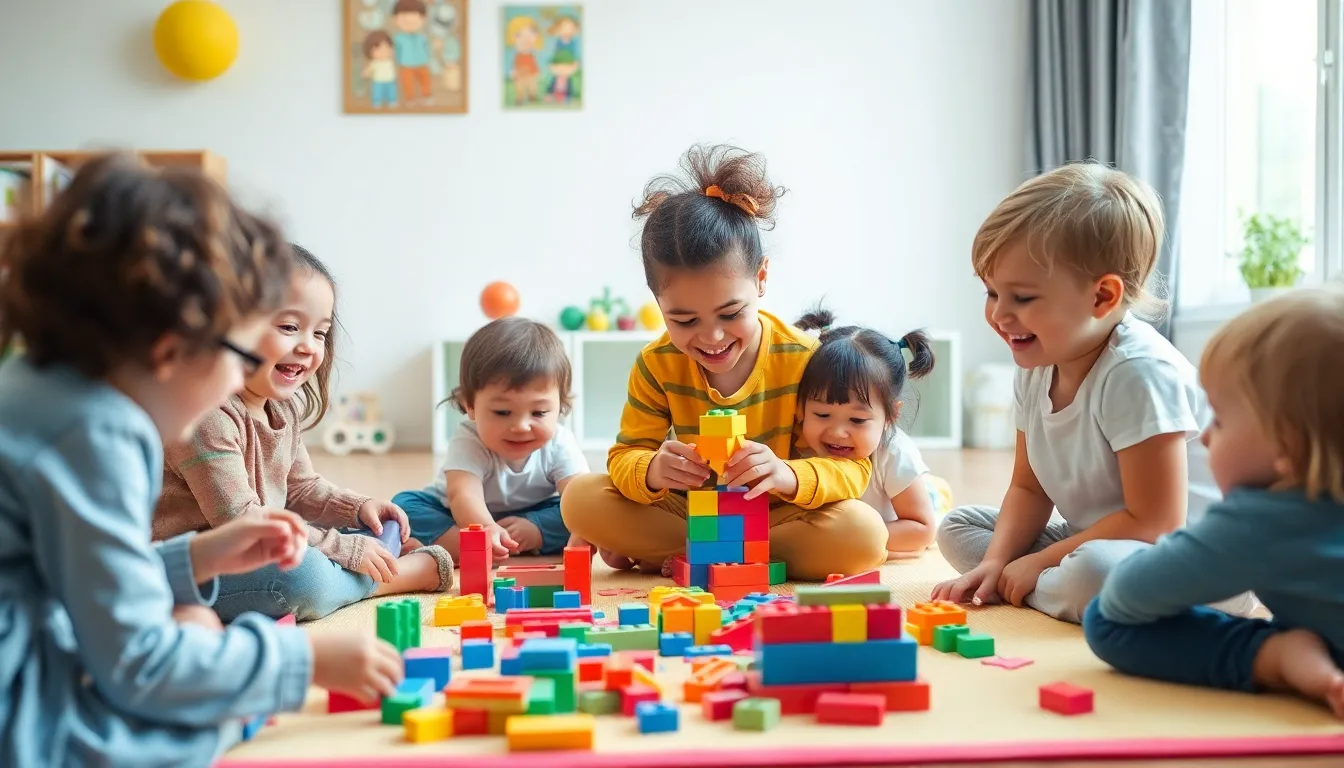
Educational toys come in various forms, each serving unique developmental purposes for 3-4 year olds. Selecting appropriate types can enhance children’s learning experiences while keeping them engaged.
Building Blocks
Building blocks promote spatial awareness and fine motor skills. These toys come in numerous shapes and sizes, encouraging creativity and imaginative play. Children learn to balance and create structures, fostering problem-solving abilities. Block sets that include letters or numbers also aid in early literacy and numeracy skills. Brands like LEGO and Mega Bloks offer options suitable for young children, ensuring safety and educational value.
Puzzles and Problem-Solving Toys
Puzzles and problem-solving toys engage young minds in critical thinking and logic development. They come in various formats, including jigsaw puzzles and shape sorters. Completing a puzzle enhances concentration and patience, while selecting the right pieces promotes pattern recognition. Many puzzles now feature numbers, letters, or animals that encourage learning through play. Popular choices include Melissa & Doug puzzles, known for their high-quality designs and educational benefits.
Art and Creativity Kits
Art and creativity kits ignite imagination and promote self-expression. These kits typically include tools like crayons, paints, and craft supplies, allowing children to explore various artistic techniques. Engaging in creative activities improves dexterity and hand-eye coordination. Kits focusing on themes or educational concepts can also introduce new vocabulary and ideas. Brands such as Crayola offer age-appropriate materials ensuring safe, enjoyable creative experiences for young children.
Choosing the Right Educational Toys
Selecting educational toys for 3-4 year olds involves careful consideration of several factors. Age appropriateness and safety are critical elements that influence effective learning through play.
Age Appropriateness
Age appropriateness correlates directly with a child’s developmental stage. Toys designed for this age group encourage cognitive growth and physical skills. For instance, building blocks stimulate spatial awareness, while puzzles enhance critical thinking. Toys that match a child’s capabilities prevent frustration and promote engagement. Choose toys labeled for the 3-4 year age range, ensuring they meet specific developmental needs. Engaging with age-appropriate toys fosters curiosity and exploration, creating opportunities for hands-on learning.
Safety Considerations
Safety holds top priority when selecting toys for young children. Opt for educational toys constructed from non-toxic materials and free of small parts that could pose choking hazards. Each toy should meet stringent safety standards set by governing bodies like the Consumer Product Safety Commission. Examine labels for certifications, such as ASTM or EN71, to ensure compliance. Consider the manufacturing reputation and user reviews to gauge quality. Ultimately, prioritizing safety helps create a secure environment where children can learn and play without risk.
Popular Educational Toys for 3-4 Year Olds
Selecting educational toys engages children while supporting their development. The right toys spark curiosity and creativity, making playtime a valuable learning experience.
Top Brands and Recommendations
Leading brands like Melissa & Doug, Fisher-Price, and LEGO produce quality educational toys. Melissa & Doug offers wooden puzzles that enhance problem-solving skills, while Fisher-Price provides interactive toys that promote social interaction. LEGO Duplo sets cater to building and imaginative play, encouraging spatial awareness. Other noteworthy brands include VTech and Hape, which create engaging electronic and eco-friendly toys. Parents frequently praise these toys for durability and safety, ensuring a reliable learning environment.
Unique and Innovative Options
Innovative options like Osmo introduce technology into playtime, featuring interactive games that blend digital learning with physical play. Magnetic tiles from Magna-Tiles encourage creativity and spatial reasoning, allowing kids to build structures easily. Snap Circuits provide an introduction to basic engineering concepts, enabling hands-on exploration of circuits. Additionally, Play-Doh sets enhance fine motor skills through sculpting fun. Each of these options offers distinctive learning experiences, catering to various interests and developmental goals.
Choosing the right educational toys for 3-4 year olds can significantly impact their development. These toys not only entertain but also nurture essential skills like problem-solving and social interaction. By selecting age-appropriate and safe options, parents can create a rich learning environment that fosters curiosity and creativity.
With numerous brands offering innovative and high-quality toys, it’s easier than ever to find the perfect fit for each child’s unique interests. Investing in educational toys not only enhances playtime but also lays a strong foundation for lifelong learning and growth. Prioritizing these toys ensures children have the tools they need to thrive in their early years.


